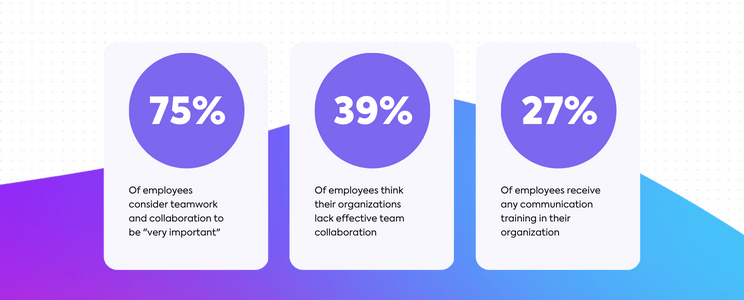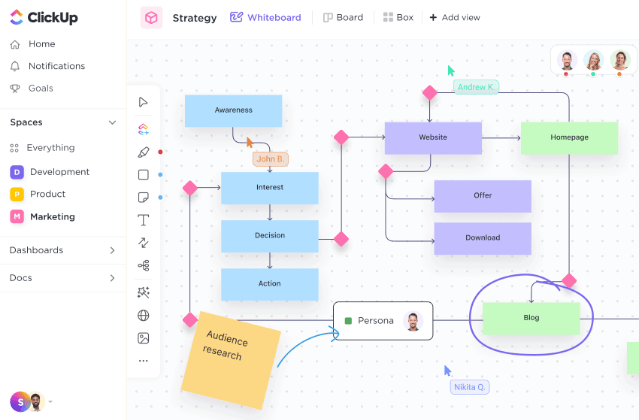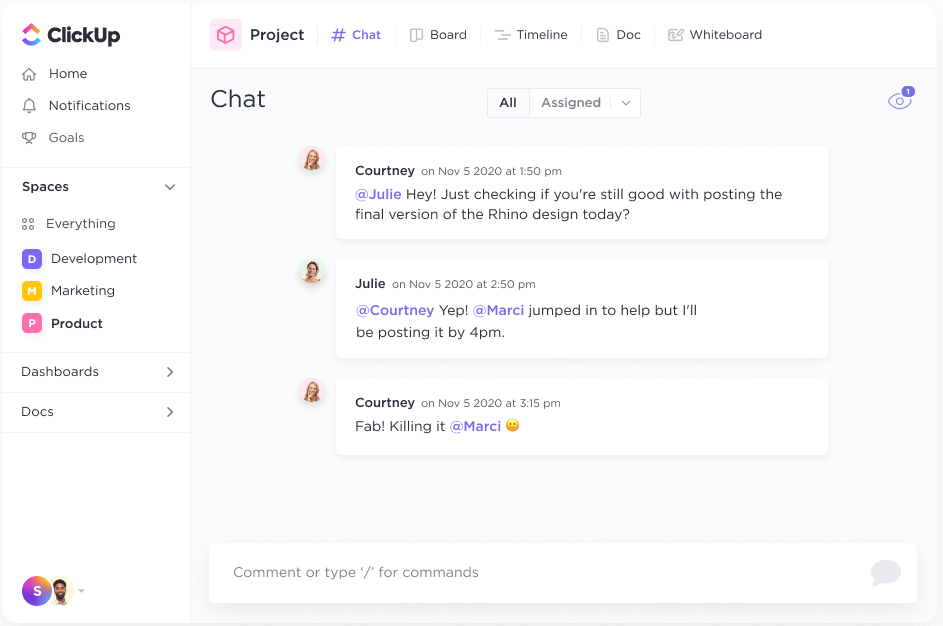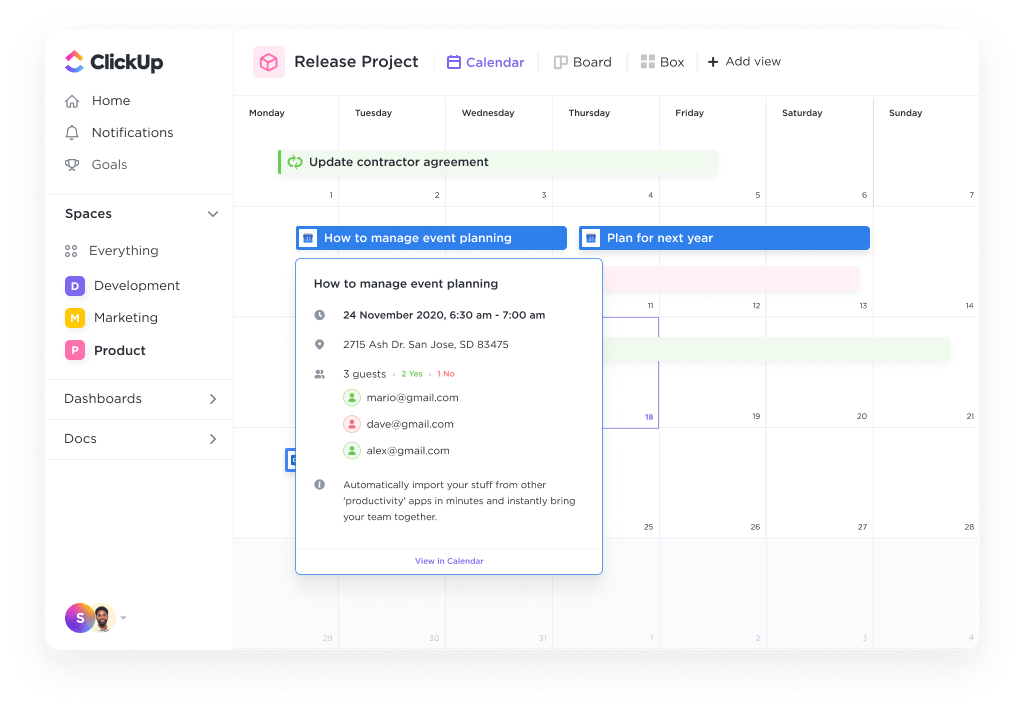

In today’s dynamic business world, team collaboration plays an instrumental role in ensuring success. It fuels innovation, fosters diversity in problem-solving, and encourages the sharing of knowledge and skills.
At ClickUp, we believe that teamwork isn’t just about working together, it’s using each team member’s different strengths to achieve shared goals. In this blog, we’ll delve into the nuances of team collaboration, exploring its impact on productivity and offering insights to optimize your collaborative efforts.
Whether you’re a start-up or an established organization, understanding the importance of collaborative teams can give you a competitive edge over your competitors.
Let’s get started!
- What is Team Collaboration?
- Types of Team Collaboration
- 10 Team Collaboration Strategies
- 1. Use team collaboration software
- 2. Build cross-functional teams
- 3. Focus on team efficiency
- 4. Have focused meetings
- 5. Prioritize team inspiration
- 6. Set team norms for better team performance
- 7. Use the right mix of team collaboration tools
- 8. Add reusable templates to your workflow
- 9. Improve your team communication
- 10. Break down your biggest silos
- Team Collaboration Tools
- On-Site Vs Remote Team Collaboration
What is Team Collaboration?
Successful team collaboration happens when teams of two or more people work together to accomplish a common goal. This process requires a high level of communication, trust, and respect among each team member. And when it’s done right, it leads to some pretty amazing results.
Benefits of Effective Team Collaboration
A Queens University survey found 75% of employees think collaboration is essential in the workplace. But only about 39% of employees believe their company isn’t collaborative enough.

When people work together, they share ideas and come up with solutions faster. It gives way for teams to solve problems creatively and produce higher-quality work.
Successful team collaboration also helps your team members feel more engaged and invested in their work. If you’ve ever been part of a team, you know it’s easier to get motivated and focus on a shared goal.
And the most impactful benefits you’ll see from effective team collaboration include:
Increased productivity
A no-brainer, right? Still, it bears repeating. When team members are able to collaborate with fewer roadblocks in the way, they get more work done in less time. This ultimately leads to elevated levels of productivity for the entire team.
Improved communication
Team collaboration ensures everyone involved is on the same page. Any project misalignment is handled quickly, and you deal with fewer misunderstandings that slow down results.
Added flexibility
Collaborative tools and software can give team members the ability to work from anywhere at any time—which results in a more flexible schedule for team members to collaborate asynchronously or in real time.
Check out these asynchronous tools!
Improved decision making
Who doesn’t like to make better decisions?
When team members collaborate more effectively, they align different points of view, skills, and data for better decisions that lead to better results.
The list of benefits that come from real team collaboration is long. However, an important aspect of ensuring team collaboration is equipping each team member with the right tools to succeed.
Types of Team Collaboration
- Asynchronous collaboration: This type of team collaboration is where members are working on different tasks and communicating at different times, either via email, chat systems or other messaging platforms. Asynchronous collaboration can help to achieve results more efficiently while allowing for better flexibility to accommodate to different work schedules.
- Synchronous collaboration: Synchronous collaboration is when team members are working together in real time and virtually communicating live. It requires everyone to be online at the same time to discuss topics, share ideas or complete a project. This type of collaboration allows for more efficient decision-making and can also help build relationships between team members.
- Cross-functional collaboration: Cross-functional collaboration involves having team members from different areas of the organization working together to achieve a goal. This type of collaboration allows for different perspectives and skillsets to be used, which can lead to more innovative and creative solutions.
- Parallel collaboration: Parallel collaboration is when two or more teams are working on tasks that are related but require distinct skill setsor have different goals. This type of collaboration can help to divide the workload and make a task more manageable for teams to complete.
- Hybrid collaboration: Hybrid collaboration combines elements from asynchronous and synchronous collaboration, allowing teams to work together in real time but still giving members the freedom to manage their own schedules. It’s an effective approach when teamsneed to collaborate on tasks but also need to be flexible with their time.
- Offline collaboration: Offline collaboration is when teams are working together without the use of technology, instead relying on physical meetings and workshops to develop ideas and find solutions. This type of collaboration can help create a collective team experience while fostering strong relationships between members.
10 Team Collaboration Strategies
1. Use team collaboration software
You’ll need a top-notch team collaboration tool to really level up. Thankfully, ClickUp is the tool to do it. Check out these resources and features to manage your teamwork.
To start, check out this handy Getting Started tutorial that will outline everything you need to know about ClickUp.
Here’s a quick rundown of ClickUp’s key collaboration features:
- Hierarchy: How you create your Spaces, Folders, and Lists is the first step to boosting team collaboration
- Projects and Lists: Other platforms lack the organization required for great work. Sure, you can start off in a good spot, but as your tasks increase, things get out of control. Projects and Lists give you more flexibility and control over how to do your work
- Checklists and Templates: Never miss a step of a task, and knock them out one by one. This works well for tasks with multiple steps that have to be done by different people on your team. You can also save the checklists as templates to use again and again
- Multiple assignees: Collaboration means working together! And sometimes it takes more than one person to finish a task. With ClickUp, you can always assign a task to more than one person, and even assign comments
- ClickUp Notepad: Jot down reminders and action items that you want to share with others later
2. Build cross-functional teams
Traditionally, most teams take an assembly line approach, with each worker contributing to their assigned tasks in the production line.
But there’s another way: Combine team members with different skills, talents, and interests so they can work together to create a product faster.
The beauty of cross-functional teams is that they can tackle a particular problem with more efficiency and fewer steps in between. Add automation to the mix and features like Goal tracking in ClickUp and you’re off to the races.
3. Focus on team efficiency
What in fact, makes an effective team? Whether you think it’s all about culture, or setting better goals, here are some quick ways to improve your team’s effectiveness:
- Send a note of encouragement if something isn’t going to plan
- Point out what’s going well rather than only pointing out team failures
- Schedule a brainstorming session for that nagging problem
- Use your project management tool
- Pursue feedback from your team leaders
- Set clear personal and work goals
4. Have focused meetings
We’ve all sat through meetings that didn’t seem worth it with no end in sight. In fact, you may not even know what the point of the meeting was in the first place.
This happens more often than most of us would like, which erodes team morale and energy levels. In short: Don’t zap your team’s energy with pointless rambling. Optimize your meetings.
Related resources:
- 12 tips on how to plan a meeting
- Manage your meetings with ClickUp
- How to use ClickUp for agendas
- How to conduct great kickoff meetings
5. Prioritize team inspiration
While your team may be pumped to cross tasks off their list and take in the feedback from their managers one day, they can very well come into work with zero inspiration the next.
What can you do? Consider using gamification as a way to keep team members motivated. For example, awarding karma points to team members that they can stack and redeem for worthwhile prizes.
If you want to take things further, find creative ways to encourage rest to reduce burnout. Your team will thank you and will be better equipped to collaborate in the long run.
6. Set team norms for better team performance
What standards does your team need to create a better collaborative culture?
What rules of engagement should your leadership use with your employees? Team norms are just the first set of standards for decorum in the workplace.
It takes the guesswork out of what it takes to move projects along between every team member when things aren’t going as expected.
7. Use the right mix of team collaboration tools
Don’t miss out on tons of amazing software tools specifically designed to make work faster and easier.
To start, this collaboration tools list will help you out. It’s jam-packed with everything a collaborative team might need. Even if your team is already ahead of the curve, you’re bound to find something to help you.
Want even more? Review these digital and analog tools to keep you organized.
Bonus: Best Buddy Movies for Teamwork
8. Add reusable templates to your workflow
If you’re asking your team to do similar tasks every day, every week, or every month, then it’s time to store the details, info, and checklists in a reusable template. Thankfully, there is a ClickUp Template for every type of use case!
Take your templates a step further and connect your tasks with recurring due dates and you’ll get a reminder, too. Hands down, templates save time and spare your team the inevitable busy work that comes with collaborating.
9. Improve your team communication
It’s never a bad day to be prepared with ways to communicate with your team more effectively.
Without implementing better communication strategies, you’re bound to deal with problems that bleed into other areas of work:
- Failing to meet deadlines
- Dropping the ball on tasks
- Asking for additional time
- Asking for time off
Consider being constant about meeting with your team jointly as well as one-on-one. It’s a way to stay in the know of what’s happening from an individual as well as a group perspective.
10. Break down your biggest silos
Silos are a collaborative team’s biggest hurdle.
Unless you want to encourage poor decision-making, lower project visibility, and make work more painful than it needs to be, doing the work of breaking down team collaboration silos is crucial to a sustainably productive team.
Here’s what you can do:
- Set shared goals and make them super visible to every member of your team
- Template processes and systems that are used constantly
- Uphold accountability across the team around sharing progress and data
- Unify all your project data and project history in one accessible platform
- Encourage visibility with group-oriented tools
Team Collaboration Tools
The first step to creating a collaborative work environment? Make sure you have the right collaboration tools in place.
Here are some of the must-have tools:
Collaborative project management tool: A project management tool like ClickUp helps your team keep track of tasks, deadlines, and progress while centralizing everything they need to move a project forward.

Team chat tool: Chat tools like Slack are essential for keeping individual team members connected and facilitating communication. Though a team leader can also use built-in chat features that many tools like ClickUp provide.
File sharing tool: A file-sharing tool like Google Drive enables your entire team to share key documents, images, and other files quickly and easily. That’s why ClickUp Docs is an awesome feature to centralize documents, assign tasks to those docs, and easily share with members of your team.
Video conferencing tool: A video conferencing tool like Zoom enables your team to stay connected even when they’re working remotely and in different time zones.
Digital whiteboard: The ClickUp Whiteboard equips teams with all the visual collaboration tools they’d use to brainstorm, refine projects, and come up with their best ideas.

On-Site Vs Remote Team Collaboration
On-Site Team Collaboration
On-site collaboration happens differently from remote collaboration, though the end goal is still the same. Consider a few tips that’ll help you level up your on-site collab sessions.
Eliminate roadblocks
If amazing team collaboration is the goal, you won’t be able to make it too far without first taking the time to eliminate any roadblocks that may stand in the way. This means you need to provide your team with the best team collaboration software so they’re able to connect, edit, question, and log ideas.
For example, features that eliminate roadblocks in a collaborative tool like ClickUp include:
- Built-in document creation tools to map out processes and timelines
- Automated reminders to ensure teams communicate on schedule
- Time tracking features to get a high-level overview of where your team’s time is spent
- Custom form creation tools for idea intake and organization

Create a collaborative culture
Fostering an environment where people feel comfortable working together and sharing ideas takes setting the tone. One way to do this is to have regular team meetings where everyone is encouraged to participate by those in leadership positions.
You can also create a team chat channel where people can freely ask questions and share ideas on their own time.
Bonus: Team Building Activities!
Strengthen open communication
This looks like creating an environment where people feel comfortable voicing initial opinions, ideas, rebuttals, and doubts about anything needing discussion.
Chats, docs, role assignments, tasks, mark-up history, and forms all help to enable a continuous communication process.

Remote Team Collaboration
On-site collaboration was the traditional way to move projects forward and make better decisions. But now, remote work is the new norm for many teams today.
This is why it’s important to find reliable ways for remote teams to communicate just as effectively as if they were in the office exchanging ideas face-to-face.
Here’s how to encourage team members to collaborate productively.
Get every team member up to speed
When everyone is aware of the team’s goals, they’re more likely to stay aligned and hit their milestones on schedule. Make sure everyone is on the same page by holding regular team meetings (virtually, of course) and keeping communication open.
Promote transparency
Encourage transparency by setting up a virtual “water cooler” where team members can chat casually. Or hold regular check-ins where everyone can share what they’re working on through a live Zoom chat.
Cadence matters here. While you don’t have to bog down your team with tons of Zoom meetings, you can schedule a recurring meeting every few weeks where teams can share feedback constructively.

Centralize, centralize, centralize
Siloed team resources are the worst. Information gets lost in the shuffle and visibility is nowhere to be found. But there are a number of great tools out there like ClickUp that help remote teams stay connected and centralize both the tools and the resources remote teams need to execute projects.
Encourage social interaction
Just because your team is remote doesn’t mean they can’t socialize with one another. In fact, social interaction can be a great way to encourage collaboration.
Hold virtual happy hours or coffee breaks, or set up a virtual book club where team members can discuss what they’re reading.
Celebrate successes jointly
When your team achieves a goal, make sure to celebrate together. This will help team members feel like they’re part of a cohesive unit, and it will encourage them to work together toward future success.
Learn more ways to build effective teamwork!
ClickUp: The Best Tool for Collaborative Teams
Whoever said successful team collaboration is hard probably didn’t read this guide. Kidding, mostly. But the verdict is in: Team collaboration is possible and can be productive. Even more so when you have the right tools in tow.
Take your team collaboration strategy from novice to world-class connoisseur with ClickUp!




